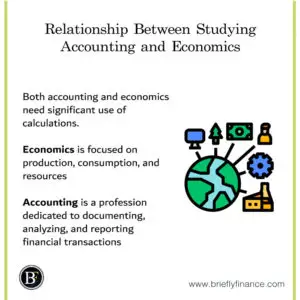Both accounting and economics are required courses for every business degree. You may wonder whether they have any connection at all. If economics is related to everything, then what is the point of learning accounting?
Both accounting and economics need significant use of calculations. Yet economics is focused on production, consumption, and resources, accounting is a profession dedicated to documenting, analyzing, and reporting financial transactions.

Attribution: The icons has been designed using resources from flaticon.com
Why should I study accounting?
Professional accountants are a vital part of any company. An accountant’s responsibility is to monitor the inflow and outflow of cash inside a business.
Budgets, costs, and revenues are documented and evaluated using a variety of ways, and the resulting information is used to create financial records. Their contributions are important for foreseeing the financial impact of any proposed change or anticipated future event on a company.
By definition, an accountant’s records are a time capsule that records the financial history of a business or person for a certain time period. For purposes of both tax administration and providing reliable financial information to stockholders, compliance with generally accepted accounting principles (GAAP) is essential.
Information or reports generated by contemporary accounting systems correspond to the concepts of being timely, relevant, reliable, comparable, and consistent. Generally recognized accounting principles are used all across the world to facilitate this data exchange.
Importantly, such standards are observed by publicly traded companies when reporting quarterly and yearly financial reports.
If you decide to major in accounting, you’ll learn about the rules and procedures that control how companies handle their financial transactions. You will develop expertise in accounting regulation, forensic accounting, and business industry principles as you learn to analyze financial reports and the ethics behind accounting methods and corporate strategy.
Among the many topics are:
- Business Fundamentals
- Financial Reporting
- Management Accounting
- Forensic Accounting
- Risk Management
- Taxation
- Auditing
The accounting field is diverse and offers several potential careers, such as Chartered Accountant, Tax Manager, Valuation Analyst, Investment Adviser, Treasurer, Auditor, and Budget Analyst. A broad variety of companies, from the Fortune 500 to those devoted to the arts and humanities, may offer you employment opportunities.
Why should I study economics?
Economics, in its wider definition, is the study of how resources are divided among people. Economists, outside academia, examine and investigate the production and distribution of commodities and services in the real world.
Policymakers rely heavily on economists to formulate new economic policies and assess the potential effects of existing ones. They are in high demand in the banking, insurance, and manufacturing sectors because of their ability to analyze and predict market trends.
There are two major subfields of economics:
Macroeconomics studies large-scale systems like countries. It involves monitoring and analyzing a wide range of economic indicators, such as inflation and productivity, to determine the health of the economy.
Microeconomics focuses on the individual market. Whether it’s an individual person or a firm, microeconomics examines how they function within a larger economic system. Issues related to how people’s choices affect the overall distribution of resources are at the heart of this field of study.
In addition to financial exchange, economics also takes into consideration time, effort, and output in the form of goods and services. For economists, more important than companies are societies at all levels: local, national, and global. That’s what this field of study, which focuses on optimizing the use of existing resources, is all about.
Among the many topics are:
- Business Analysis, Methods, and Techniques
- Microeconomics and Macroeconomics
- Political Economy
- Forecasting
Economics majors may pursue careers as Economists, Analysts, and Statisticians.
Final Thoughts
Although economists are more interested in the macroeconomic patterns that influence money, accountants focus on the details of money’s comings and goings.
Related Posts:
- 6 Reasons Why Accounting is the Language of Business
- Is Accounting Hard? 6 Myths and their Realities
- Is Accounting a Good Career | Everything you Need to Know
Disclaimer: Above links are affiliate links and at no additional cost to you. I may earn a commission. Know that I only recommend products, tools, services and learning resources I’ve personally used and believe are genuinely helpful and relevant. It is not because of the small commissions I make if you decide to purchase them. Most of all, I would never advocate for buying something that you can’t afford or that you’re not yet ready to implement.
